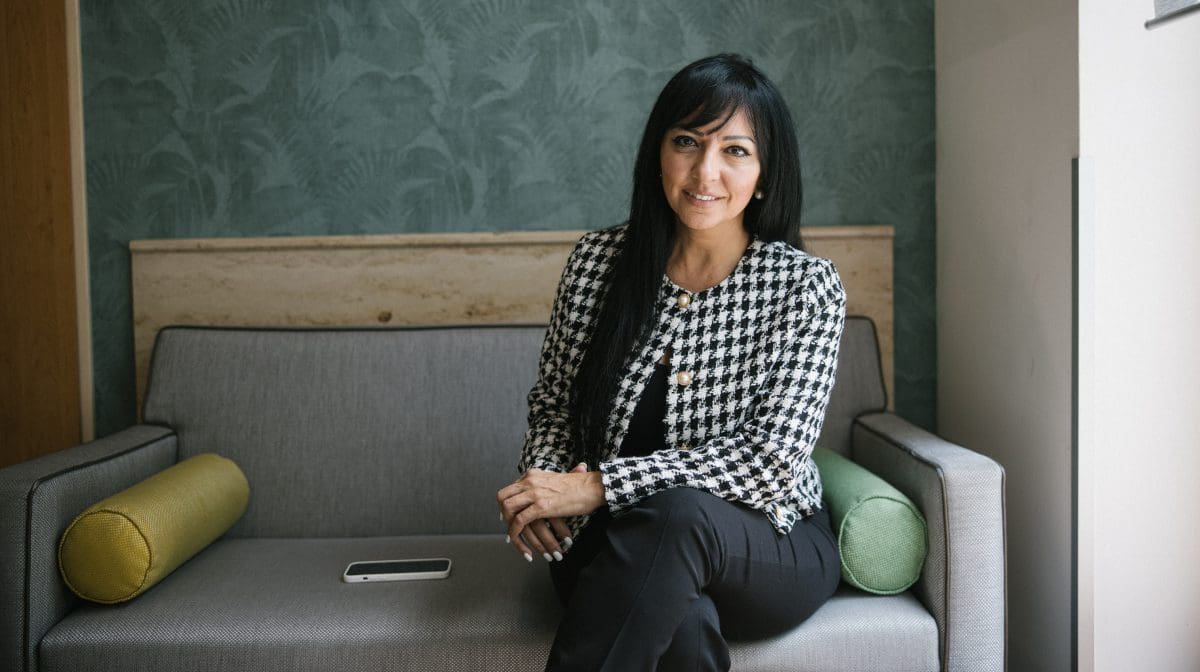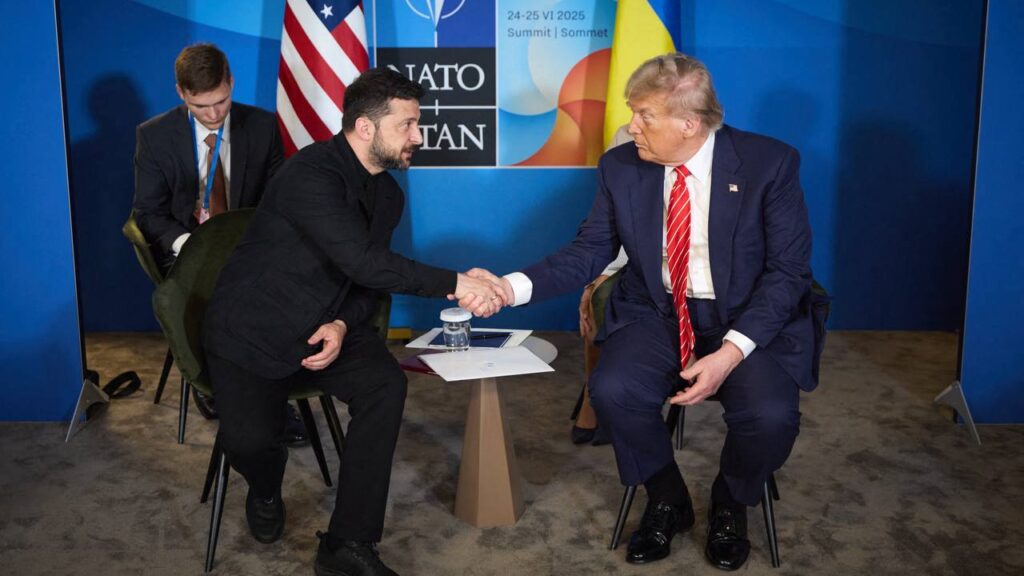On 5–6 September, the Danube Institute held a conference titled ‘Christians, Violence and the Middle East’, where speakers from all over the world came to Hungary to give an overview of the phenomenon of violence against Christian communities and institutions in the Middle East. Systematic attacks on Christians constitute not only one of the most acute crises of our time but are also a mostly neglected issues in the mainstream media and the academic world. One of the keynote speakers of the conference was Juliana Taimoorazy, founder and president of the Iraqi Christian Relief Council, 2021 Nobel Peace Prize nominee, leading international advocate for the Assyrian people, speaker, and writer. Ms Taimoorazy gave a moving speech at the conference about her personal story and the plight of Christians in the Middle East, especially in Iraq and Iran.
Juliana Taimoorazy experienced first-hand how difficult it is to live as a Christian in a Middle Eastern country. She was born into an Assyrian Christian family in Tehran, Iran, one of the worst countries in which to live as a Christian. At the age of six, she lived through the 1979 Islamic Revolution, which radically changed the lives of women and Christians in the country. After the revolution, she and her family faced harsh discrimination and violence because of their faith. Even though she was only six years old, she had to wear a hijab when she left the house, and at school, she was under constant pressure to convert to Islam, and when she resisted, she was severely humiliated. Eventually, life in Iran became so difficult for her and her family that they decided to leave Tehran behind—in 1989, at the age of 16, Juliana was smuggled out of the country. After she moved to the US, she made it her life’s mission to help Christians in need. In 2007, she founded the Iraqi Christian Relief Council to shed light on the plight of Christians in her ancestral homeland and to raise funds to deliver food, shelter and medicine to Iraq.[i]
At the conference, Juliana Taimoorazy began her speech by quoting the following from Holocaust survivor and Noble Prize winner, Professor Elie Wiesel: ‘The opposite of love is not hate, it is indifference’. She chose this quote to express her gratitude to Hungary for responding to the suffering of Christians in the Middle East not with indifference, but with love and help. Ms Taimoorazy especially thanked the Hungary Helps Agency for providing 2 million euros in aid for the reconstruction of a Christian town in Iraq that was destroyed in 2014. In recognition of the gesture, the town was renamed Tel Askouf, meaning ‘Hungary’s daughter’.[ii]
The number of Assyrians has decreased from one and a half million to less than 100 thousand in the last twenty years
As an advocate for Assyrian Christians, Ms Taimoorazy emphasised that forcing Assyrian Christian minorities out of Iraq’s Nineveh Plains, the land of their ancestors, did not begin in 2014, when ISIS took over Mosul, but it has been an ongoing process since 2003. She highlighted the heart-breaking fact that the number of Assyrians has decreased from one and a half million to less than 100 thousand in the last twenty years. Over these past decades, not only has the number of Assyrians plunged, but the 6700 years of history and heritage of the Assyrian people have been destroyed in Iraq as well. On top of the persecution they had been subject to before, in 2014 ISIS began an outright war against their religious and cultural heritage. As a terrible blow to the Assyrian people, the terrorist organisation destroyed the 3,000-year-old ancient gates of Nineveh in Mosul[iii] and the ancient Assyrian ‘Tree of Life’ stone panel in Nimrud. Ms Taimoorazy emphasised that the rapids decline of the number of Assyrians and of their heritage is not only a result of physical persecution. While Assyrians are being killed in the East, they are dying culturally in the West due to assimilation, she stressed.

Before concluding her speech, Juliana Taimoorazy shared a moving message about why it is so important not to turn our backs on suffering or persecuted minorities, but to listen to their stories and speak out against injustice. She cited the Biblical story about Cain and Abel and emphasised that, unlike Cain, we must become our brothers’ keepers, regardless of our faith. ‘Listening to a witness makes you a witness. When you listen to a witness, your bones whisper along with the ones who speak,’ Juliana quoted Elie Wiesel. She reminded that ‘When we forget about them, we kill the victims twice, so we must become storytellers, as this is the first step in helping those who are suffering,’ she added. She then stressed again that Hungary had proven its fidelity to persecuted Christians by listening to and sharing with others their stories, and by providing those suffering with aid.
Ms Taimoorazy is also an example of how we should be helping persecuted minorities, even if they are not of our faith. Apart from her work aiding Christians, she has spent a lot of time building relationships between Christians and the Jewish communities in the Middle East, and she leads the efforts of Assyrians in America to fight against anti-Semitism in various communities. Currently, she is a member of the Simon Wiesenthal Centre’s Midwest Region and of the advisory council of The Witness Institute, which strives to continue the work and legacy of Holocaust survivor and Noble Prize winning professor Elie Wiesel. Before our conference, we spoke with Juliana Taimoorazy in a Danube Institute podcast titled Reflections from Budapest, where we touched on this topic and asked why she thinks it is so important to stand up for Jewish minorities in the Middle East. She explained that the fight against anti-Semitism was natural for her, because unlike the majority of Iranians—who are forced to hate the United States and especially the Jews—she had been taught by her father from a very young age to love the Jewish nation and the US. Her other reason for supporting them is that Jews and Assyrians share a kind of common destiny: historically, they speak very similar languages, since their root language is Aramaic, and in different ways, but both have suffered similarly throughout history and both want to return to their homeland. She added that their common destiny also manifests itself in a symbolic way: in 2014, when ISIS attacked Mosul, they sprayed the Arabic letter ‘nun’ (ن) on the city’s buildings, which stands for Nazarenes, as Christians follow Jesus of Nazareth. Therefore, whenever she sees a swastika on the wall of a Jewish store, home, or synagogue, she remembers the Arabic letter intended to label Christians and set them apart from the rest of Iraqi society.
Government people, like your Hungarian legislators, must step up
Finally, after learning about the desperate situation of Christians in most Middle Eastern countries, the question arises: can we stop the removal of Christians from the region, or is the process irreversible? Juliana Taimoorazy answered this question as follows in the Reflections from Budapest podcast: ‘In this regard, US policy has betrayed us. Government people, like your Hungarian legislators, must step up, not only with aid, but also with appropriate policies, to stop this process. If education starts on the ground and policies are made from the top, I think there is a chance.’
You can watch Juliana Taimoorazy’s speech here:
You can learn more about Juliana here:
[i] ‘About the Founder’, Iraqi Christian Relief Council, https://iraqichristianrelief.org/about-us, accessed 10 October 2022.
[ii] Gábor Sarnyai, ‘Iraqi Town Renamed Hungary’s Daughter in Return for Rebuilding Aid’ (26 August 2018), Hungary Today, https://hungarytoday.hu/iraqi-town-renamed-hungarys-daughter-in-return-for-rebuilding-aid/, accessed 10 October 2022.
[iii] Kristin Romey, ‘Exclusive Photos Show Destruction of Nineveh Gates by ISIS’ (19 April 2016), National Geographic, https://www.nationalgeographic.com/history/article/160419-Islamic-State-ISIS-ISIL-Nineveh-gates-Iraq-Mosul-destroyed, accessed 10 October 2022.








